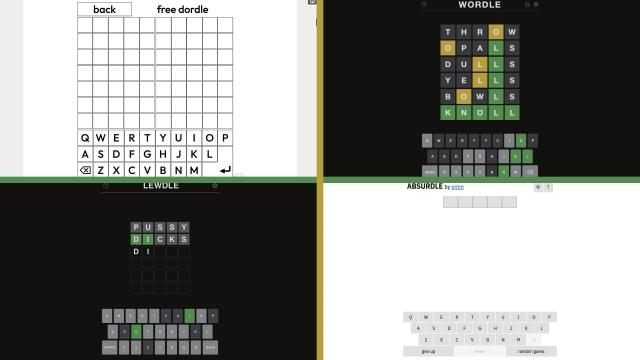Wordle, the browser-based word-guessing game that has overtaken Twitter, is very good. It is so good, in fact, that it has spawned over half a dozen different variants (and some rip-offs) made by fans of the original. These range from the antagonistic Absurdle to the extremely difficult, two-word Dordle. Wordle is not the first word-guessing game of its kind in existence, but it is the first to take off in this way online, so it’s no wonder that new fans are experimenting with the format.
The most simple variant is Lewdle, which just functions exactly like Wordle, but with a different word list. Lewdle only accepts words that are “lewd,” which is a word I hate using (and to protect my sanity it will not appear again at any point in this article). This list includes “boobs,” “pussy,” “dicks,” “fucks,” and so on and so forth. ProTip, try words with “cks” in your opening guess, you’ll knock out a lot of potential words very quickly. Lewdle is, like Wordle, a daily game in which everyone gets the same word, which sets it apart from many of the other newly released Wordle variants.
Lewdle is functionally indistinguishable from normal Wordle, which many variants have ended up being. However, this simple variation is enough to shake up the game, which highlights the basic strength of Wordle’s premise. Most of these variants also adopt Wordle’s simple presentation, allowing the delightful feeling of guessing words to take centre stage. This presentation and focus on simplicity is what set Wordle apart from similar word-guessing games like Lingo, which is so bloated with mobile game mechanics as to be nearly unapproachable. Wordle, and its many simpler variants, have drawn attention to this fundamental flaw of many modern, mechanically simple games by cutting it out entirely.
Despite the simplicity of some variants, others totally change what’s happening behind the scenes. Absurdle is among the most involved, and — for those of you who need your word-guessing fix — you can replay it as many times a day as you’d like, because a new word (or in Absurdle’s case, words) is generated each time you play. The premise of Absurdle is simple, but its implementation extremely complex. Absurdle hates you and doesn’t want you to win so it’ll do anything to prevent that, including changing the word you’re actually guessing.
Absurdle’s goal is to give you as little information as possible, your goal is to force it into settling on a single word. To do this, Absurdle creates “buckets” of words in which it keeps possible solutions that match your guess, and always selects the biggest bucket possible. So if you guess “HELLO,” it will choose the largest collection of words that do not match the criteria, which in this case is words that don’t contain an “H,” “E,” “L,” or “O.” This process repeats with the game picking the largest bucket each time. Eventually, you can manipulate the game into choosing a specific word as the buckets get smaller and smaller. It is probably my favourite of the variants I’ve played so far as it manages to deliver an interesting spin on the formula without being too easy or difficult.
Dordle, on the other hand, is a nightmare that only begets pain and sorrow, so only accomplished word-guessers should give this one a try unless you like getting owned by a video game. Dordle asks you to guess two words simultaneously, and only gives you seven guesses to do so. This is very difficult, because a lot of words exist and, surprisingly, many of them use different letters than others. I would know because, as a writer, look at letters and words all the time.
Dordle’s high difficulty does a lot to draw attention to the design excellence behind games like Wordle, which feels almost perfectly tuned to reward players at any skill level. There are optimal guesses in Wordle, especially in the early game. Figuring out your vowels and refusing to waste guesses on already-tried letters will do a lot to contribute to your score, but you can also stubbornly use the same first guess every time (mine is “QUEST” because I like “QU” combinations) and still have a shot at victory every day. The same cannot be said for Dordle, which demands immaculate word guessing at every turn.
Wordle and its many spin-offs are stellar examples of what happens when smart people mess around for fun. Stripped clean of monetisation models and any interest in being for the majority of people, these games can be as simple or complex as they like, and likely increasingly strange as time goes on. I’m excited to see what incredibly weird word-guessing games will emerge from the collective consciousness next.

Leave a Reply